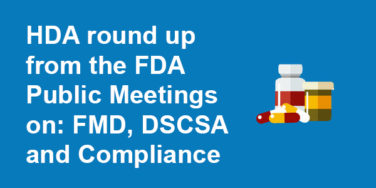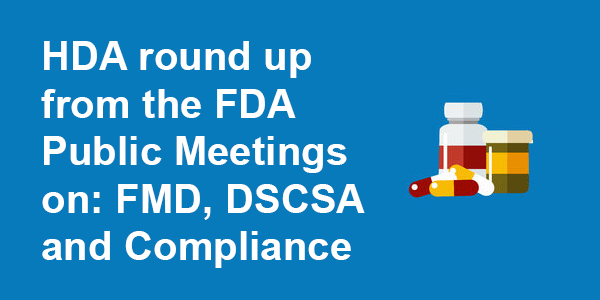HDA round up from the FDA Public Meetings on: FMD, DSCSA and Compliance
With the Falsified Medicines Directive (FMD), the Drug Supply Chain Security Act (DSCSA) and serialization compliance being the hot topics within the pharma industry, we wanted to roundup the latest news and opinions across the market today and from FDA Public Meetings.
On March 26th, The Healthcare Distribution Alliance (HDA) submitted written public comments to the FDA. The comment was in response to the third and final FDA Public Meetings held on February 28th 2018, to explore the enhanced drug distribution security provisions under the Drug Supply Chain Security Act (DSCSA).
HDA summarised its views with three separate takeaways:
- Deeper insight into areas of the industry consensus and confusion
With consensus on a distributed data architecture and the operational importance of aggregation and inference, there remains confusion on the details around terms or phrases in the law (e.g., “facilitate the gathering”) and interoperability.
Whilst the system is standards based and some foundational work will be done in 2019, many specifics still need to be developed — including further details around the system(s) FDA and the supply chain envision in 2023.
- The initial expectations for the 2023 system
There is a clear need for continued work to resolve issues related to expectations, technology and processes – and what the industry feels it can achieve within the current milestones.
Whilst the shared goals of patient safety and access are clear, there is an industry concern that certain analytics and interoperability functionality might not be currently possible based on a distributed architecture with today’s technology.
- The differing perspectives and challenges of FDA and trading partners
The HDA welcomed the participation from a larger industry group, including regulators and distributors, regarding concerns and to understand thinking and current approaches and challenges to achieving DSCSA compliance. Reaching 2023 must be a highly collaborative endeavour and the FDA meetings provided a unique forum to discuss these across sectors.
In addition, in late March rfxcel hosted a webinar alongside the Belgian-based, non-profit European Medicines Verification Organisation (EMVO) to discuss the on-boarding of partners to the European Medicines Verification System (EMVS). The EMVS was set up in response to the 2011 Falsified Medicines Directive (FMD) and designed to help Europeans identify and prevent consumption of falsified medicines.
With 100+ attendees, rfxcel and EMVO outlined the EU FMD/ Delegated Regulation, discussed exactly how to on-board your organisation and how to choose a gateway provider (IT Partner). Both Fanny Trenteseaux of EMVO and Mark Davison of rfxcel, took the audience through a step-by-step guide to on-boarding.
From both the webinar and the recent HDA public submission, rfxcel’s main recommendations for successful serialization include:
1: Get executive buy-in: do not underestimate the significance of serialization
2: Assemble a multi-disciplinary team: include representatives from manufacturing, supply chain, IT, legal/regulatory and partner/contract management to understand how serialization can be applied across multiple organisational boundaries
3: Establish long-term user requirements to ensure you’re ‘future ready’: create a design template that is flexible enough to be interoperable and implementable between national systems and provides the flexibility to adapt to change as it happens.
4: Understand the data implications of FMD & DSCSA – and where the datasets reside across your organization
5: Choose the right software, and consider quality; data validation and network connectivity carefully
6: Choose the right partner – find a vendor that can partner with you to design responsive solutions that go beyond technology, and who is committed to your success
7: Act now: With the biggest price of non-compliance being your inability to ship product, is it worth the risk?
For more information contact us here






